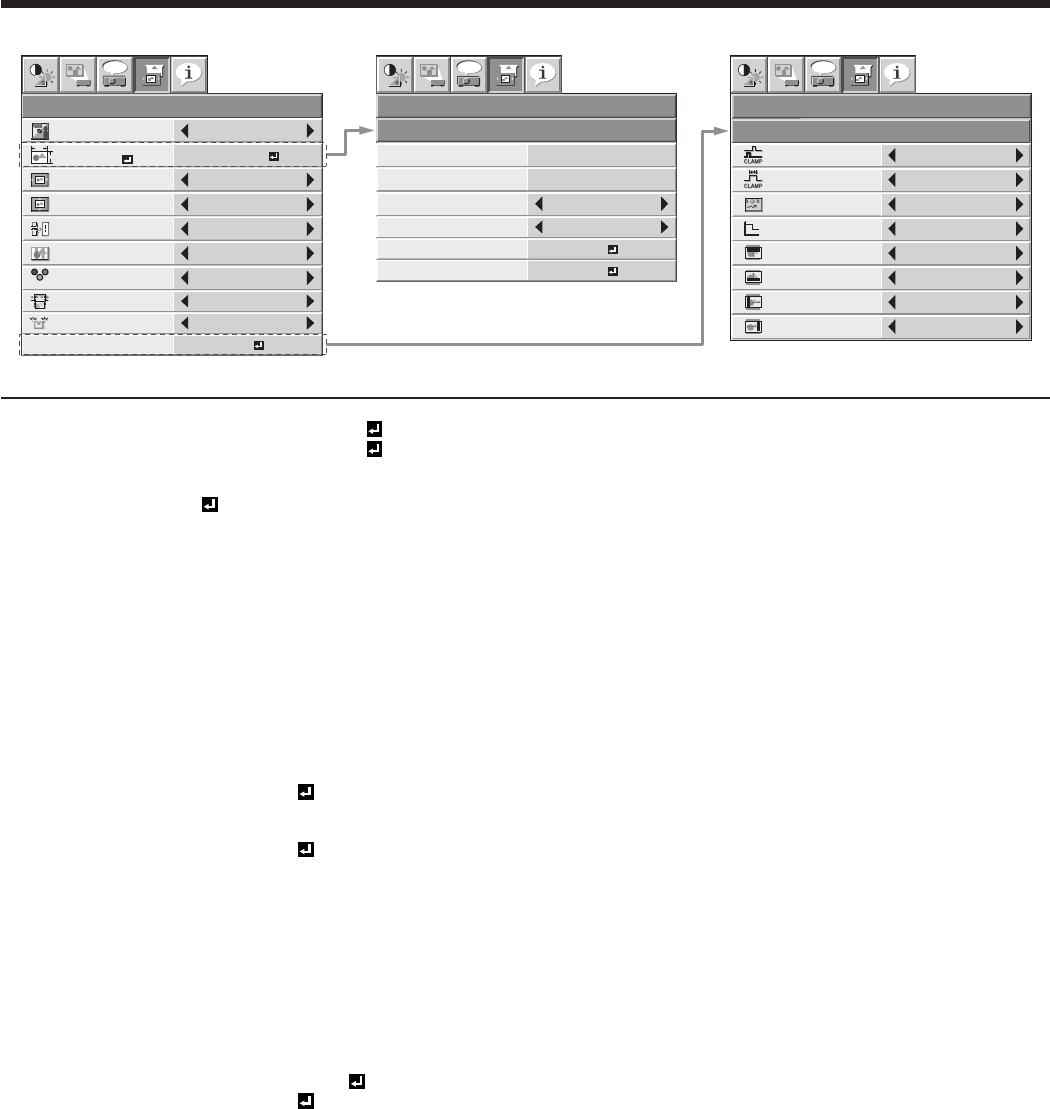
EN-32
SIGNAL menu
USER
1
CLAMP WIDTH
CLAMP POSITION
1
LPF OFF
SHUTTER(U) 0
SHUTTER(L) 0
VERT. SYNC AUTO
?
SHUTTER(LS) 0
SHUTTER(RS) 0
SIGNAL
opt.
SIGNAL
VERTICAL
FREQUENCY
HORIZONTAL
FREQUENCY
75.04 Hz
HORIZ. PIXELS
1024
60.02 KHz
CANCEL
opt.
OK
OK
EXECUTE
768
VERT. LINES
RESOLUTION (MEMORIZE)
R G B
R G B
SIGNAL
HORIZ. POSITION 0
VERT. POSITION 0
TRACKING 0
COMPUTER INPUT RGB
FINE SYNC. 0
USER
opt.
OK
OFF
HOLD
100%
OVER SCAN
MEMORY CALL AUTO
RESOLUTION
(MEMORIZE )
1024 x 768
V
H
A
U
ITEM SETTING FUNCTION
MEMORY CALL AUTO /
MEMORY 1 /
MEMORY 2
Use to select the setting of RESOLUTION (MEMORIZE) already saved.
Impossible to select if no setting has been saved. AUTO is selected by
default. It optimizes the signal format automatically depending on the type of
video signal supplied from the computer. Press the ENTER button to clear the
setting already saved.
RESOLUTION (MEMORIZE
)
The current resolution is displayed. To change the current setting, press the
ENTER button to display the RESOLUTION (MEMORIZE) menu. The new
setting can be saved to MEMORY 1 or MEMORY 2.
VERTICAL FREQUENCY
- The vertical frequency of the currently projected video signal is displayed.
HORIZONTAL FREQUENCY
-
The horizontal frequency of the currently projected video signal is displayed.
HORIZ. PIXELS 640-1920 The number of horizontal pixels of the currently projected video signal is
displayed. When you change the current setting, select EXECUTE, and then
press the ENTER button, the image is automatically adjusted according to
the resolution you set. The adjustment result can be saved to MEMORY 1 or
MEMORY 2.
VERT. LINES 350-1200 The number of vertical pixels of the currently projected video signal is
displayed. When you change the current setting, select EXECUTE, and then
press the ENTER button, the image is automatically adjusted according to
the resolution you set. The adjustment result can be saved to MEMORY 1 or
MEMORY 2.
EXECUTE OK Press the ENTER button to start the automatic adjustment. At the completion
of the automatic adjustment, a message is displayed and you can save the
adjustment result to MEMORY 1 or MEMORY 2.
CANCEL OK The process to change the current resolution is canceled and the SIGNAL
menu is displayed.
HORIZ. POSITION 0-999 Use to adjust the horizontal position of the projected image.
VERT. POSITION 0-999 Use to adjust the vertical position of the projected image.
FINE SYNC. 0-31 Use to eliminate flickering or blur, if appears, viewing the projected image.
TRACKING 0-9999
Use to eliminate vertical wide stripes, if appears, viewing the projected image
.
COMPUTER INPUT AUTO The proper setting is automatically selected.
RGB Select this option when connecting the projector to high definition video
equipment having R, G, and B output terminals.
YC
B
C
R
/YP
B
P
R
Select this option when connecting the projector to a DVD player or other device
having Y, C
B
, and C
R
(or Y, P
B
, and P
R
) component video output terminals.
OVER SCAN 100%-90% Use to adjust the display area of projected image.
HOLD OFF / ON Use to adjust the image when flagging occurs near the top of the screen.
USER OK The USER menu is displayed for the following adjustments.
CLAMP POSITION 1-255 Use to correct solid white or solid black in the projected image.
CLAMP WIDTH 1-63 Use to correct solid black in the projected image.
VERT.SYNC AUTO / OFF Use to adjust the image when its motion doesn’t run smoothly. Select AUTO
for normal use.
LPF ON / OFF Use to select whether or not to enable the LPF.
SHUTTER(U) 0-38 Use to adjust the image when noise appears on the top part of the image.
SHUTTER(L) 0-38
Use to adjust the image when noise appears on the bottom part of the image.
SHUTTER(LS) 0-63 Use to adjust the image when noise appears on the left half of the image.
SHUTTER(RS) 0-63
Use to adjust the image when noise appears on the right half of the image.
• Thoughhorizontalstripsmayappearontheenlargedprojectedimage,suchsymptomisnotamalfunction.
• Whenyouchangethehorizontalorverticalpositiontoalargeextent,noisemayappear.
• Theadjustablerangeoftheverticalpositionvariesdependingonthetypeoftheinputsignal.Thoughtheimagemaystayinthesame
position even when the setting value is changed, such symptom is not a malfunction.
• WhenyouincreasethesettingvalueofOVERSCAN,noisemayappearonthescreen.
• Seepages35and36forthedetailedsettingprocedure.
Important:
• YoucansettheIMAGEmenuandtheSIGNALmenuonlywhenthesignalissupplied.
Menu operation (continued)


















